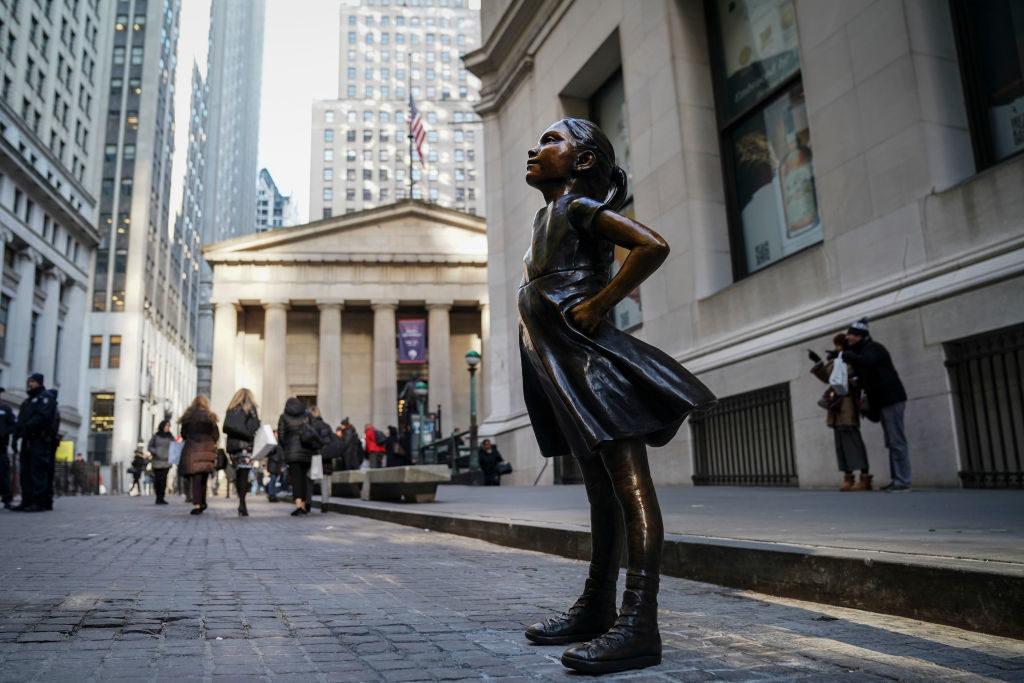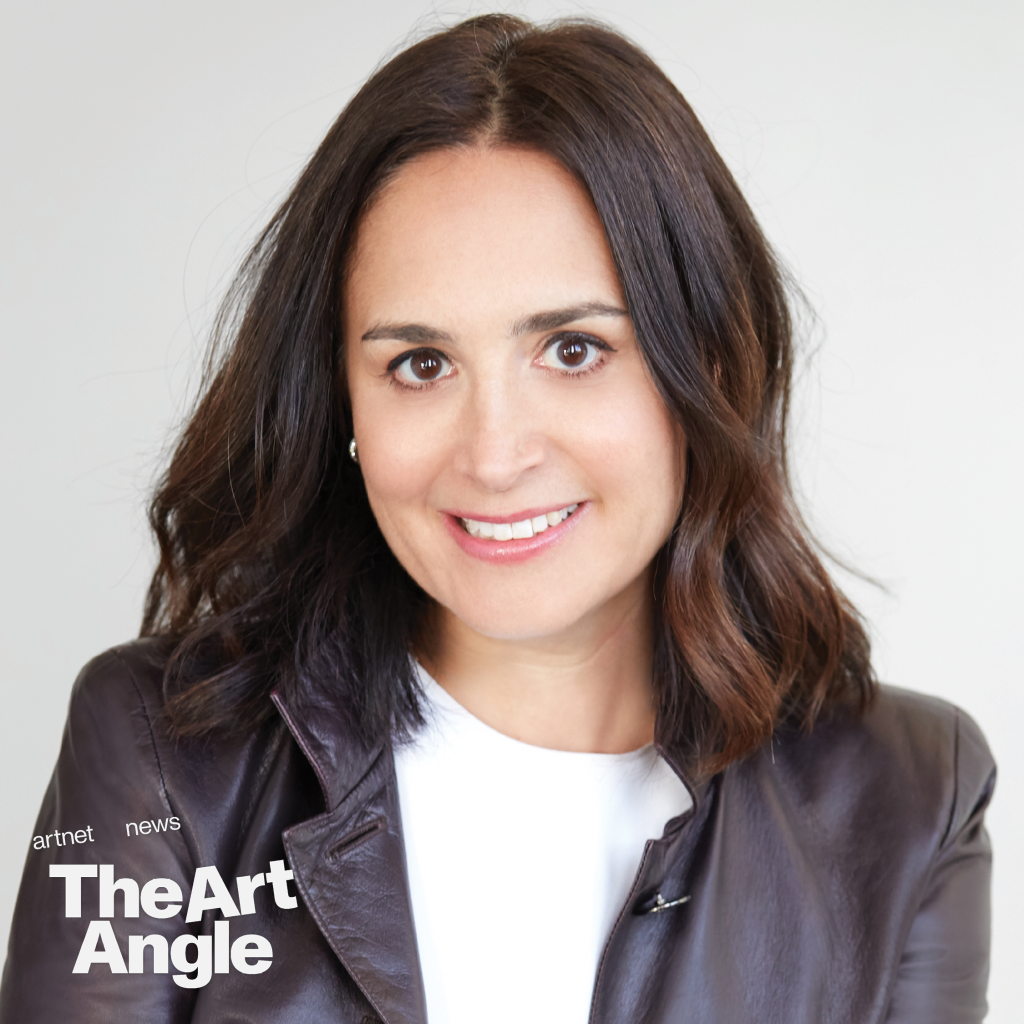Welcome to Shattering the Glass Ceiling, a podcast from the team at the Art Angle where we speak to boundary-breaking women in the art world and beyond about how art has shaped their lives and careers.
The second installment of this four-part podcast miniseries features Artnet News senior writer Sarah Cascone’s interview with art collector and media executive Catherine Levene.
Levene’s 25-year career runs the breadth of the media space, beginning at the New York Times Company in both the corporate sales realm and later as part of its burgeoning digital strategy. After obtaining her MBA, Levene ventured into media startups, and ultimately started a new company, Artspace, alongside business partner Christopher Vroom in 2011. Artspace was one of the first platforms to introduce e-commerce to the art market, and in 2014 the publishing house Phaidon bought the company, helmed by Keith Fox.
In 2020, Levene was announced as the new head of media organization Meredith Corp., becoming the first female executive to lead the magazine conglomerate that includes People, InStyle, Travel + Leisure, and FOOD & WINE.
Born in Binghamton, New York, Levene has kept a pulse on the art world, beginning a collection that she continues to build year after year.
Below, read an excerpt of the conversation.
I understand you have quite an art collection. Where did you first discover your love for art?
My grandmother was a pretty extraordinary woman for her time and was always a fan of the arts in general, whether that be performing or visual arts. She was one of the founding members of the New York State Council on the Arts, and she did a bit of collecting herself, or as much as she could from upstate New York. I think through her and then my father I just really was surrounded by people who loved art, and so through osmosis it came to me.
And when did you start collecting art? Was there one piece that kicked everything off?
When I graduated from college I came to New York and really couldn’t afford any art, but I would always go to these non-profit charity events and artists were incredibly generous and would often donate works that the organization would sell to raise money. The first piece I bought was a very small photograph by Vik Muniz in 1993, and I still have that piece today.
As I grew up in my career and was able to afford a little bit more, I would just continue to buy pieces, usually it was about a piece or two a year for a period of time. And I’d always set aside a little bit of budget in order to be able to do that.

Hassan Hajjaj, Rider (2010). Courtesy of the artist and The Third Line, Dubai.
And are there any artists or artworks that you have your eye on right now?
I always do. Right now I’ve been looking at several pieces by Hassan Hajjaj, a Moroccan photographer who sort of blends pop photography, and takes these really colorful photos of men and women dressed in beautiful wares. The latest series was Arab women in many cases wearing burqas on motorcycles—it was a really cool and interesting work.
Much of your career has been in media, but in 2011 you founded the startup Artspace. What inspired that business?
It’s actually pretty simple: I had been in media and technology for almost my whole career in 2010, which was about 20 years at that point, and I saw an open white space in the area of e-commerce and art.
There was so much activity online at the time, but very little within the art market. There were posters being sold all over, but no where you could really learn and educate yourself and then buy contemporary art from all over the world. The internet was really the perfect frictionless place to do that, so my partner at the time, Chris Vroom, and I founded Artspace to be able to bring art collecting—no matter what level you were at—to anyone. You could go online from anywhere in the world and buy a piece from any gallery in the world.
You ended up selling Artspace, and a few years later you left. Why did you leave and how did you make your way back to publishing and your current job at Meredith?
We sold the company to Phaidon, and I have to say, I’ve bought and sold a lot of companies and been on each side of the transaction before, and this was a really great collaboration. Phaidon was a great home for Artspace, and the CEO, Keith Fox, really took it on to integrate us into the existing business. We gained a lot of support and a couple of years later I realized I had done what I could with that business, and it was in great hands, and so I left.
I began consulting for early-stage companies, and while I was there I got a call from Meredith, which had recently bought Time, Inc.—for those that don’t know, Meredith Corporation is a major multi-platform media company that owns many of the brands you know and love including People, Entertainment Weekly, All Recipes, and Travel + Leisure, powerhouse brands that had been around for decades—and were transitioning into a new world of new media. I actually started my career in publishing even before the internet became a consumer medium, so it was interesting to come full circle to an industry that I knew incredibly well.

Fearless Girl at the New York Stock Exchange. Photo by Drew Angerer/Getty Images.
In recent years we’ve seen how the celebration of the visionary female founder can cut both ways, and that women can be villified for behavior in the workplace that wouldn’t necessarily be questioned in a male leader. How can women leaders be committed to maintaining a supportive, positive work environment while still running a successful business?
I think where we are in business today is incredibly well suited to women. We are very used to being in a world where we’ve got to juggle family and home along with all of the expectations many of us have of being a mother and in business, which is incredibly complicated.
Personally, I think the kind of leadership that we’re moving into, which is an empathetic leadership focused on communicating, is perfect for women. My advice is just to continue to stay in it, I know it can be difficult juggling all of the various needs of our time, but it’s a great time to be in the workforce for women.
Listen to the other episodes of Shattering the Glass Ceiling, a podcast miniseries from the Art Angle, below.
Curator Lauren Haynes on Working to Forge a Fuller Story of American Art
Curator and Author Legacy Russell on Rebuilding Art Institutions From Within
Art Dealer Mariane Ibrahim on the Power of the Right Relationships











